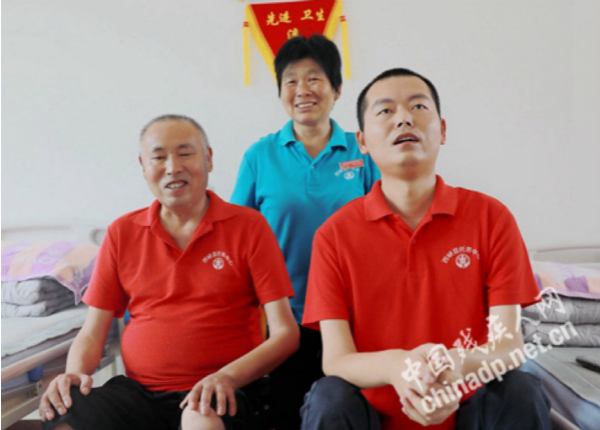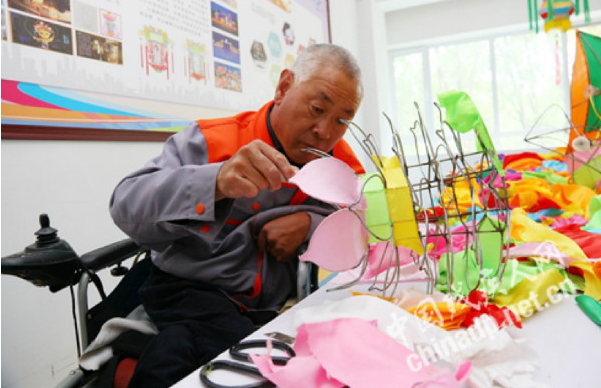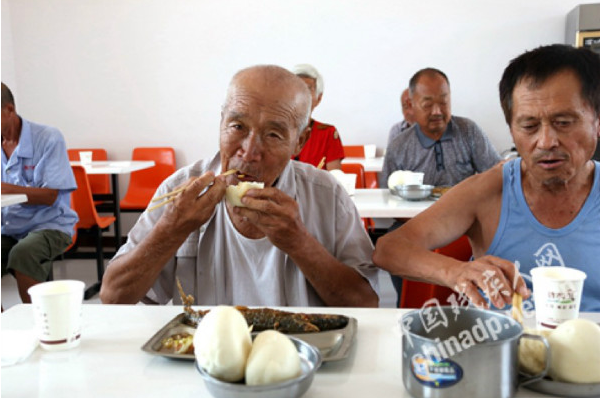Expand the access of people with disabilities to living allowances and nursing care subsidies
"The living allowances for people with disabilities in financial difficulty and nursing care subsidies for people with severe disabilities have greatly improved our livelihoods. Although they are not a large amount of money, yet they can afford us to buy enough food at home," said Yu Mangen, a recipient with severe disability from Nanchang, capital city of China's Jiangxi Province, in an interview when he was receiving another round of such subsidies ahead of the arrival of the New Year.
Yu was very grateful for the financial assistance worth several hundred RMB yuan.
China officially established a subsidy system to provide for the living expenses of disabled persons in need and to pay the nursing costs of persons with severe disabilities in September 2015. It was the first such a national welfare system especially for people with disabilities.
According to the subsidy system, living allowances would be provided to poverty-stricken families of people with disabilities since 2016. People with severe disabilities are eligible for nursing care subsidies.
Local authorities are encouraged to expand the coverage of such financial assistance to the families of people with mild intellectual and mental disabilities and other kinds of disabilities if they are financially affordable.

People on the photo are Lin Hongyao (L) and Lin Hao (R), his son, both of whom have become handicapped because of muscular atrophy several years ago. They come from a rural family in Xixia, a county in Central China's Henan Province. Learning their conditions, local disabled persons' federation helped them apply for living allowances and nursing care subsidies and found a nursing care institute for them in a move to further reduce their financial burden incurred from nursery service.
As of March 2020, about 11.5 million people with disabilities had been covered with living allowances. Meanwhile, over 14 million persons with disabilities had an access to nursing care subsidies. In other words, over 50 million families of people with disabilities have benefited from such policy in the country.
Social assistance guarantees basic livelihood of people with disabilities
East China's Zhejiang Province has provided a full-scale financial support in line with subsistence allowances to adult people with severe disabilities and other people with intellectual and mental disabilities classified in the third and fourth degrees.
In addition, medical aid and temporary assistance are also accessible to local people with disabilities.
An 18-year-old man and his twin sister are from a poverty-hit rural family in Huzhou, a city in Zhejiang. A medical examination shows that both of them are eligible for the requirements of first-degree physical disabilities because of their congenital cerebral palsy.
They have now been provided with subsistence allowances and living subsidies per month, which remarkably reduce their family's economic burden in the attendance of them.
During the 13th Five-Year Plan (2016-20), China has further strengthened its social assistance for people with disabilities and taken target measures to ensure their basic livelihoods.
Seven central authorities, including the China Disabled Persons' Federation, the Ministry of Civil Affairs and the Ministry of Finance, jointly issued a guideline in September 2015 to intensify their work of social assistance for people with disabilities.
The guideline has further specified social assistance policies for people with disabilities in the fields of subsistence security system, medicare, education and housing. Unemployed adult people with severe disabilities can be covered with subsistence security allowances if they are in financial difficulties and rely on other family members to support them.
According to a directive on reforming and improving China's social assistance system by general offices of the Communist Party of China Central Committee and the State Council, necessary measures should be taken to guarantee the basic livelihoods of people with severe disabilities from low-income families. Specifications are also made on social assistance policies featuring categorized and differentiated approaches and material support plus with service.

An adult person with physical disability from Longde Nursing Center for People with Disabilities in Northwest China's Ningxia Hui Autonomous Region is making festival lanterns. Apart from housing local people with disabilities in the nursing center, local disabled persons' federation has building workshops for them to become self-employed.
As of December 2019, there were about 9.6 million people with disabilities living on subsistence allowances in China. Nearly three million people of them were covered alone.
The level of subsistence allowances for people with disabilities from poverty-stricken families has seen an increase of five percent to 20 percent in Shanxi, Inner Mongolia, Liaoning, Shanghai and Shaanxi. Zhejiang has expanded the coverage of subsistence allowances to the disabled from impoverished families and those with mild intellectual and mental disabilities.
More other provincial regions such as Guangxi and Fujian in the country have taken similar measures to improve the livelihoods of people with disabilities as well.
All these measures have contributed much to ensuring the basic livelihoods of the disabled and their families, especially those from poverty-stricken families and relying on the nursing of other family members.
The adoption of group-based nursing service relieves economic burden of families of people with disabilities
Huang Cuiying is a rural woman from Caixian, a county in Henan. Her husband became severely paralyzed when a traffic accident happened to him in 2012.
In addition, the family piled up huge amount of debt incurred from medical expenditure of her husband.
With the support of local disabled persons' federation, Huang found a job in a nursing center for the disabled and her husband was admitted there.
Since then, Huang has become employed whilst having time to take care of her paralyzed husband.

Nanpi, a county in North China's Hebei Province, has built nursing institutes for the elderly and people with diseases and disabilities from impoverished families at all villages there in a bid to better improve their life after they shake off poverty. The county has developed a unique nursing mechanism featuring group-based nursing service in daytime and home-based nursing service with neighborhood support for those with certain abilities to take care of themselves. It has further consolidated the progress made by local government in poverty alleviation.
Eight central authorities, which include the China Disabled Persons' Federation, the National Development Reform Commission, the Ministry of Civil Affairs and the Ministry of Finance, jointly issued a circular on accelerating the development of nursing service for people with disabilities in 2012.
The circular has called for intensified efforts to support and speed up the development of nursing service for the disabled.
Thanks to professional planning, home-based nursing service has seen a remarkable progress in parallel with the development of institutes with accommodation and daytime nursing service.
The State Administration for Market Regulation and China's Standardization Administration jointly released a guideline to regulate nursing service for people with intellectual, mental and physical disabilities in different ages and levels of employment in June 2019.
It was the first such a national standard pertaining to nursing service for people with disabilities.
Moreover, the country has launched a"sunshine home planning" project financed by central budget to provide local governments with guidance in the implementation of personnel training for the nursing service for people with disabilities and to facilitate the professional and regulated development of such an industry.
During the 13th Five-Year Plan (2016-20), local governments in China have adopted a set of policies and measures, which include the distribution of government subsidies, the purchase of service, the creation of public welfare-related jobs, and the supply of group-based nursing care, daytime nursing care and neighborhood-supported nursing care service, to better meet the demand of people with disabilities either in financial difficulties or in severe conditions.
As of February 2020, about 14.5 million people with disabilities had been covered with basic old-age insurance in China, accounting for 90 percent of the total population of the disabled. A rising number of them have been guaranteed with care for the elderly.

